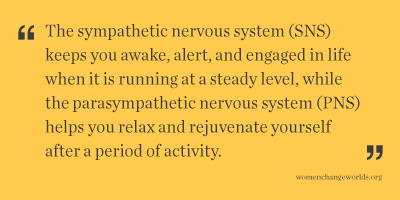
Twenty-five years ago, when I was studying the human nervous system in medical school, I learned that the body has an automatic system running in the back ground 24/7—the autonomic nervous system—like the system that runs in the back ground of your computer updating time and date without needing to be asked. I was taught that the autonomic nervous system had two branches with opposite functions. The sympathetic nervous system (SNS) keeps you awake, alert, and engaged in life when it is running at a steady level, while the parasympathetic nervous system (PNS) helps you relax and rejuvenate yourself after a period of activity.
In popular science the SNS and the PNS are associated with their most dramatic functions—the fight, flight, or freeze responses that are activated when a person is threatened. If a bear charges you on a hike or your boss yells at you at work, bam, your SNS fires causing energy and blood flow to be diverted to your large muscles, heart, and lungs. You automatically assess the situation and either gear up for a fight or run like hell away from the threat. On the other hand, if you come across a mother bear with her cubs and she is standing over you ready to pounce and there is nowhere to run or your spouse comes home drunk and mean again and has a history of attacking you, your parasympathetic nervous system might activate causing you to freeze and even fall on the spot as your heart and respiratory rate decrease dramatically and your body’s pain  killers flood your system buffering the pain. Neither of these reactions are under your conscious control. You are automatically protected.
killers flood your system buffering the pain. Neither of these reactions are under your conscious control. You are automatically protected.
What happens, though, when what you are facing is a kind, welcoming face or your favorite pet? Do you need to then rely on conscious functioning, do you need to think about it before you act and engage? According to Stephen Porges, the answer is “non.” He has discovered a third branch of the autonomic nervous system—one he calls the smart vagus nerve—that innervates the muscles in the face, throat, vocal chords, even the tiny muscles in your inner ear. The smart vagus balances the SNS and PNS and gives us automatic responses to safety. Imagine meeting your best friend—chances are your mouth breaks into a smile, your eyebrows raise, and you tune in and listen a little more attentively. You share stories and maybe even eat a meal together. All of these activities stimulate the smart vagus nerve which travels to the heart and lungs and tells the SNS and PNS they are not needed. You feel calmer.
The capacity to feel calm in a healthy relationship is as natural and automatic as the ability to feel terrified in Friday the 13th. It is how we are wired. A culture that teaches “self-regulation” and finding comfort by standing on your own two feet over stimulates your SNS making it harder to recognize a healthy connection. In Four Ways to Click: Rewire your Brain for Stronger, More Rewarding Relationships you can evaluate your neural pathways for connection and strategize ways to rebalance your autonomic nervous system to help you feel responsive and less reactive in your healthiest relationships.
Amy Banks, M.D., has devoted her career to understanding the neurobiology of relationships. She was an instructor of psychiatry at Harvard Medical School and is the Director of Advanced Training at the Jean Baker Miller Training Institute (JBMTI) at the Wellesley Centers for Women at Wellesley College. She is the author with Leigh Ann Hirschman of the forthcoming book, Four Ways to Click: Rewire your Brain for Stronger, More Rewarding Relationships (Penguin Random House).
When you subscribe to the blog, we will send you an e-mail when there are new updates on the site so you wouldn't miss them.
Comments